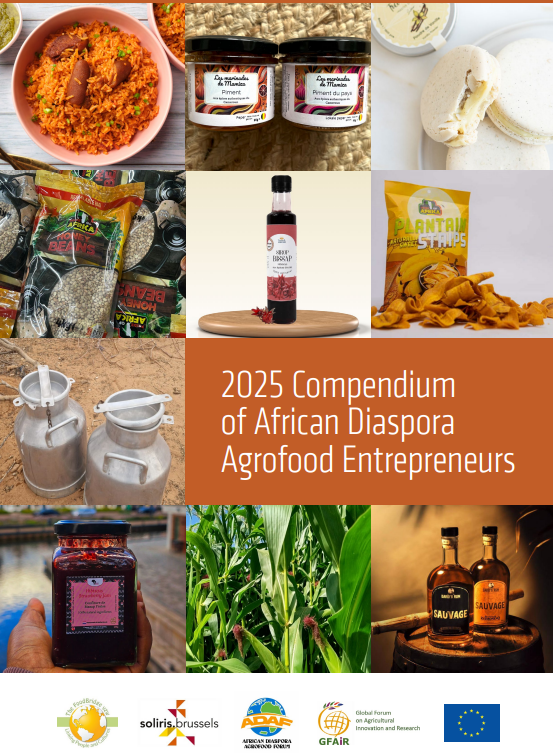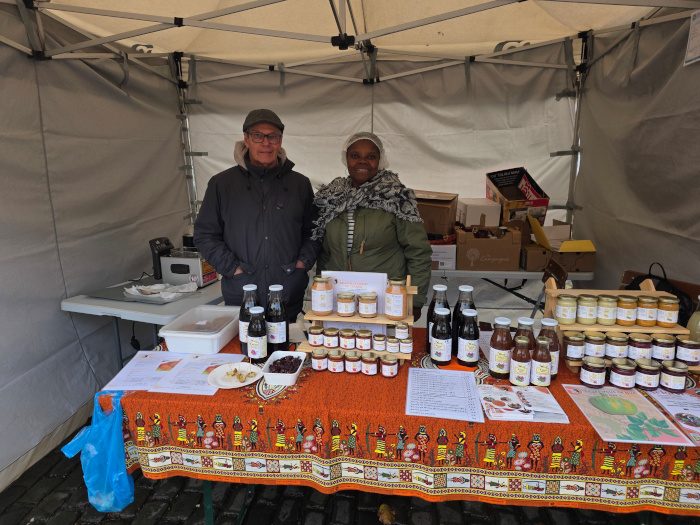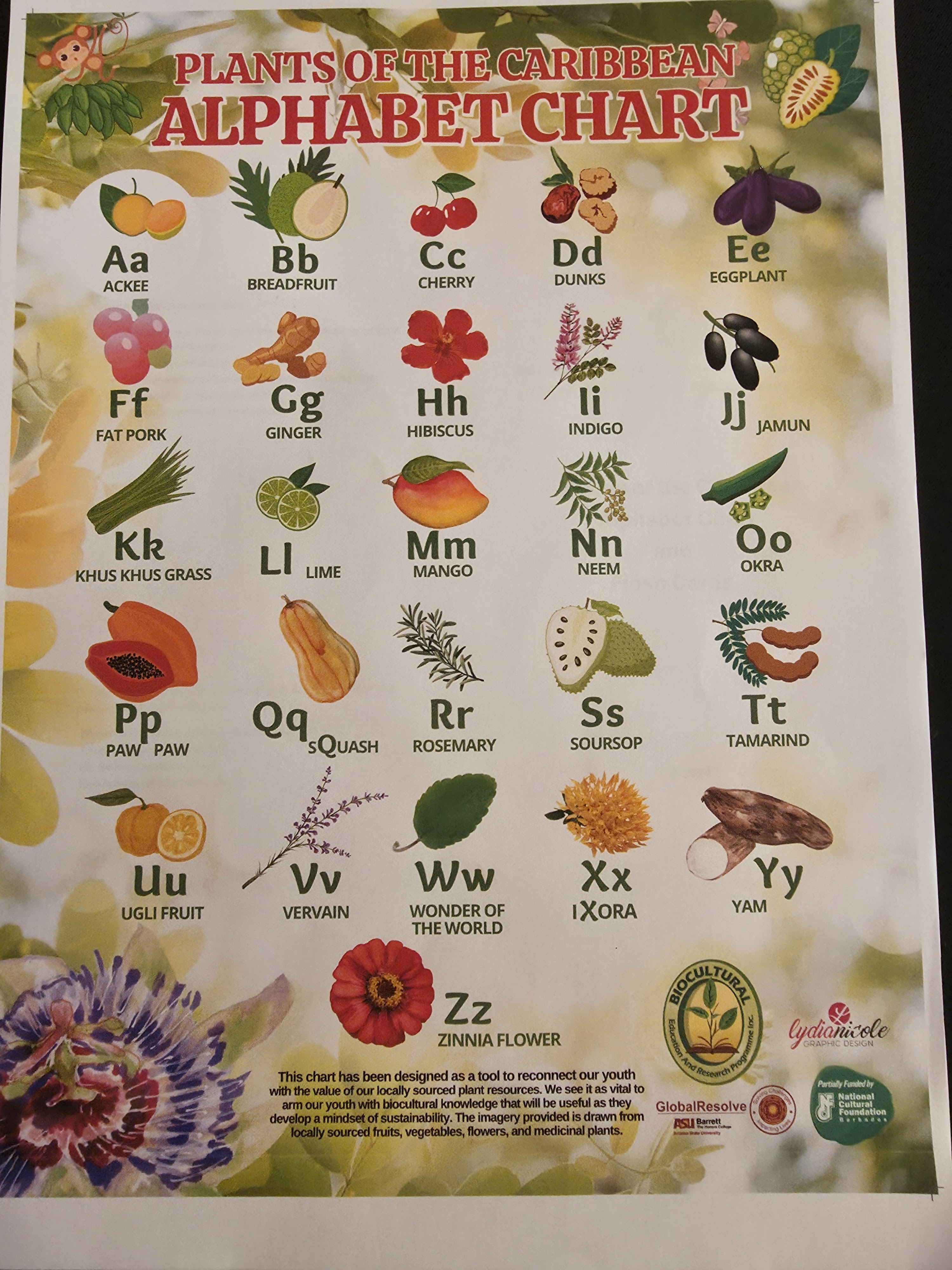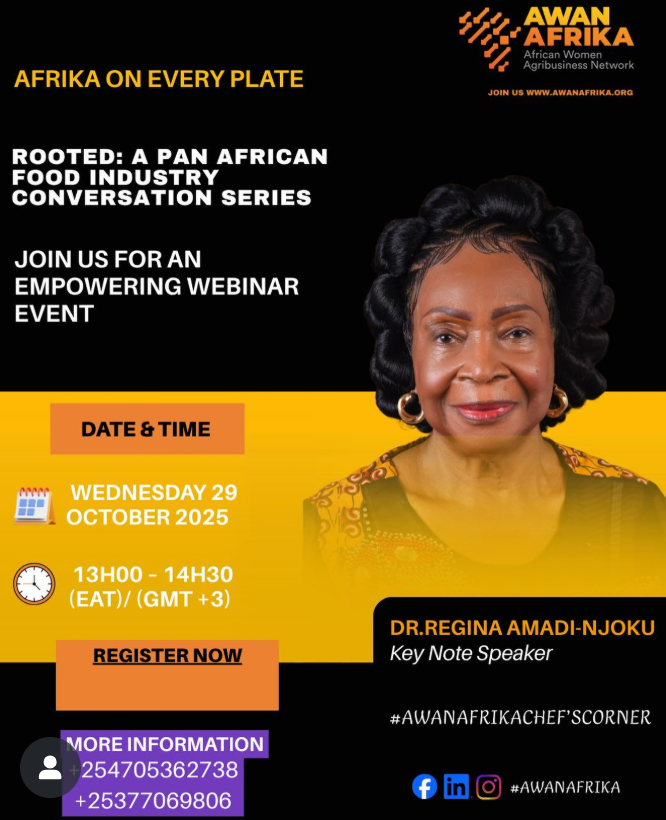
24–25 October 2025. Brussel, The 9th African Diaspora Agrofood Forum (ADAF25), spotlighted African diaspora women’s entrepreneurship in agrifood systems.
- Day 1 (at the Beurs/Bourse) was a conference day with keynotes, panels and networking
- Day 2 (at Marché aux Poissons/Sainte-Catherine) featured an open exposition and product showcase.
The organiser, The Food Bridge vzw, with support from GFAiR’s Collective Action on Forgotten Foods, framed the Forum around policy advocacy, visibility for women-led businesses, and partnerships aligned with the Beijing+30 momentum; FAO also joined, underscoring gender equality and the strategic role of diaspora communities.
Panel discussions centred on how diaspora networks translate know-how, capital and market links into concrete opportunities for women-led agrifood ventures, with sessions and workshops on entrepreneurship support, investment readiness, market access, and policy engagement.
A featured panel included H.E. Simone Rudder (Ambassador of Barbados to Belgium), Samira Hotobah-During (Alliance Africa), and Hafsat Abiola-Costello (Women in Africa), who discussed closing gender gaps in assets, earnings, leadership and decision-making and outlined actions to channel diaspora resources into women-led agrifood businesses.
Another panel featured WINA. Women in AfroFood connects women to the tools, expertise, and opportunities that allow them to showcase their culinary and agri-food creations, from local markets to large international platforms.
- WINA – Women in AfroFood celebrates, connects, and empowers women of African descent working across the agro-food value chain—from farming and processing to gastronomy, trade, and policy. It recognises the pivotal role women play in preserving culinary heritage, sustaining local food systems, and driving innovation in agribusiness both on the African continent and within diaspora communities.
- WINA serves as a platform to showcase women-led enterprises, facilitate mentorship and investment, and advocate for gender equity in the agro-food sector, ensuring women’s voices are heard in shaping food policies and innovation agendas.
- The initiative also functions as a knowledge-sharing and visibility network, organising forums, exhibitions, and collaborations—such as its presence at the African Diaspora Agrofood Forum (ADAF)—to highlight success stories and foster partnerships between African, Caribbean, and European women entrepreneurs.
- WINA promotes traditional and “forgotten” foods, sustainable production, and cross-generational learning, positioning women not only as custodians of food culture but as key actors in building resilient, inclusive, and climate-smart food systems.
EARO presented Flavours of Africa: A Culinary Adventure".
This cookbook refers to a journey through the diverse cuisines of the African continent, exploring popular dishes like Jollof rice, tagines, and Doro Wat. This culinary exploration highlights the unique flavors, spices, and techniques from regions ranging from North African Arab-influenced dishes to West African stews and East African aromatic plates.
Across the programme, speakers and partners from government, development agencies and diaspora organisations highlighted policy levers, mentorship, and cross-border value-chain building; the second day’s expo amplified this with live showcases from entrepreneurs and networking with buyers and investors.
Resource:

Foodbridge (2025) 2025 Compendium of African Diaspora Agrofood Entrepreneurs 41 pp.
The 2025 Compendium of African Diaspora Agrofood Entrepreneurs, published by The Food Bridge vzw with support from Soliris.be and GFAiR’s Collective Action on Forgotten Foods, celebrates twelve outstanding diaspora-led agrifood enterprises that blend cultural heritage, innovation, and sustainability across Africa, Europe, and the Caribbean.
Together they have created over 140 jobs, with nine of the businesses led by women. Their work spans agro-food production, trade, livestock, and sustainable agriculture, each connecting local farmers to global markets while promoting inclusive growth and African food heritage.
Here’s a brief overview of the 12 featured enterprises:
-
EATO (Ghana/UK) – An AI-powered digital marketplace connecting African food SMEs to global buyers; aims to empower one million entrepreneurs by 2030 through digital commerce, storytelling, and fintech tools.
-
S&T Enterprises Ltd (Nigeria/UK) – A large-scale wholesale and retail distributor of African and Caribbean foods under brands like Samis Online and Pride of Africa Foods, linking African farmers and cooperatives to diaspora markets.
-
WaziEats (Cameroon/France) – Uses blockchain and AI for supply-chain traceability, reducing post-harvest losses and empowering small producers, especially women, across West and Central Africa.
- Nugaal Camel Milk Cooperation (Somalia/Netherlands) – Revives Somalia’s dairy sector by turning fish waste into camel feed, doubling milk yields and creating income for nomadic women farmers.
-
Jumah’s Corner (Ghana/Belgium) – (picture)

Promotes a circular economy through nutritious indigenous foods and beverages, linking women farmers in Ghana to catering and restaurant operations in Belgium. -
Astero’s Coffee (Ethiopia/Germany) – A traceable “tree-to-cup” coffee enterprise supporting women farmers, integrating blockchain for transparency, and investing in schools and training in Ethiopia.
-
Farafinah Food (Senegal/Netherlands) – Offers healthy artisanal products such as granolas, hibiscus jams, and juices, celebrating West African flavors and supporting women producers in Senegal.
-
Terre et Saveurs (Cameroon/Belgium) – Brings premium African spices and marinades like Penja pepper and hibiscus jams to European shelves, combining cultural pride with fair trade and sustainable sourcing.
-
Sustainable Demonstration Farms Ltd (SDFarms) (Nigeria/USA) – An organic integrated farm producing herbal teas, flours, and powders, training farmers in agroforestry and value addition for export.
-
Le Petit Traveller (Caribbean/Belgium) – A boutique spice house connecting Caribbean and Latin American terroirs to European gastronomy, working with smallholder spice producers.
-
Mkulima Ujerumani (Kenya/Germany) – The first white-maize farm in Germany, promoting sustainable local production for African diasporas, women empowerment, and cultural exchange through food.
-
La Guadeloupéenne srl (Guadeloupe/Belgium) – Imports and distributes premium agricole rums from the French Caribbean, celebrating craftsmanship while generating local economic opportunities.

Overall, the compendium illustrates how diaspora entrepreneurs serve as vital bridges between continents—transferring technology, culture, and investment to build resilient food systems that honour African heritage.

Plants of the Caribbean Alphabet Chart and Flash Cards
The “Plants of the Caribbean Alphabet Chart and Flash Cards” is an educational and cultural learning tool. It introduces children and adults to the rich plant biodiversity of the Caribbean—from food crops and herbs to trees and spices—while promoting literacy, environmental awareness, and cultural pride.
The chart and flash cards use each letter of the alphabet to represent a plant that is native to or culturally significant in the Caribbean. It is designed for classrooms, cultural education programs, and diaspora learning spaces, encouraging intergenerational knowledge transfer and appreciation of local flora that contribute to nutrition, medicine, and identity.
29 October 2025. Afrika Chefs Corner Webinar — explored how Africa’s heritage crops and culinary wisdom can shape the future of food. Theme: Indigenous Innovation — Reviving Africa’s Heritage Crops & Culinary Knowledge.
The AWAN Afrika (Africa Women Agribusiness Network) Chefs Corner Webinar is designed to spotlight how traditional African crops, culinary techniques, chefs and farmers can collaborate to drive innovation and value-chain transformation in agrifood systems.
